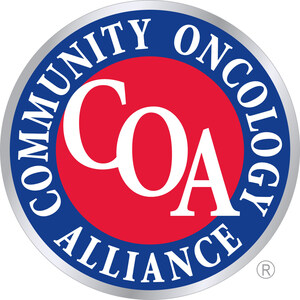Community Oncology Organizations, Clinics and Patients Support the Bipartisan "Preserve Community Cancer Care Act"
Bill Would Help Seniors and Community Cancer Clinics by Offsetting Some of the Impact of the Devastating Sequestration Cuts
WASHINGTON, May 20, 2013 /PRNewswire/ -- A majority of cancer patients receive their treatment at community clinics. Today, that care is being threatened by a payment calculation in Medicare that has made it increasingly difficult for local clinics to absorb the additional cuts imposed by sequestration. Bipartisan legislation (S. 806) introduced by Senators Pat Roberts (R-KS) and Debbie Stabenow (D-MI) – and co-sponsored by Senators Robert Casey (D-PA) and Sherrod Brown (D-OH) – would protect cancer patients' access to care in their communities and control costs for seniors and the Medicare program.
Under the current system, prompt pay discounts are negotiated terms between the manufacturer and pharmaceutical distributors for their drug delivery and supply chain management services. However, the law requires these prompt pay discounts to be included in the drug reimbursement formula even though community cancer clinics don't have access to the same drug discounts. This shortfall has already placed severe financial strain on oncology practices across the country. Since 2008, more than 1,200 community cancer centers have closed, consolidated, or reported financial problems.[1]
The new cuts imposed by sequestration have exacerbated the problem resulting in an acceleration of local clinics having to close or move patients into the hospital setting. Since sequestration took effect on April 1, community cancer clinics across the country have reported that they either will no longer be able to treat Medicare patients or eventually close, thereby depriving their whole communities of care in their local cancer clinic.
For seniors, this situation can mean disruptions in care that result in traveling farther, waiting longer, and paying more out of pocket. In 2012, Medicare beneficiaries who contacted the National Patient Advocate Foundation cited transportation costs as the primary factor contributing to medical debt crises.
For Medicare, shifting the site of care from community clinics to hospitals means higher costs for taxpayers. According to recent studies by Milliman[1] and Avalere[2], seniors, Medicare, and private insurers pay substantially less for cancer care when chemotherapy is administered in the physician office setting. In fact, according to Milliman, care of a cancer patient receiving chemotherapy costs Medicare – and taxpayers - $6,500 less per patient per year when the care is managed in a community clinic or physician office versus a hospital outpatient department.
The Preserve Community Cancer Care Act (S. 806) and House companion (H.R. 800) sponsored by Reps. Whitfield (R-KY), Green (D-TX), and DeGette (D-CO) would help stem the tide of seniors losing access to care and the consolidation in cancer care that leads to higher costs for patients and Medicare. The legislation would make Medicare reimbursement to community oncology centers consistent with providers' actual costs.
Swiftly passing the Preserve Community Cancer Care Act will help seniors and community cancer clinics by offsetting some of the impact of the devastating sequestration cuts to cancer care. It will reduce costs for Medicare and taxpayers by maintaining a system that delivers cost-effective treatment for the majority of American cancer patients and will ensure that seniors can continue to receive cancer care in a safe, convenient, and affordable setting.
We urge Senators to cosponsor and pass S. 806, the Preserve Community Cancer Care Act, for Medicare patients.
| American Society of Clinical Oncology |
Association of Community Cancer Centers |
| BDI Pharma, Inc. |
Cardinal Health, Inc. |
| Community Oncology Alliance |
Curascript Specialty Distribution |
| H.D. Smith |
HDMA |
| Health Coalition, Inc. |
Healthcare Distribution Management Association |
| Intellogics |
ION Solutions |
| Lung Cancer Alliance |
McKesson Corporation |
| National Patient Advocate Foundation |
Society for Gynecologic Oncology |
| The US Oncology Network |
UPMC Cancer Centers |
About Community Oncology Alliance (COA)
Celebrating its 10th anniversary during 2013, the Community Oncology Alliance (COA) is a non-profit organization dedicated solely to community cancer care, where four out of five Americans with cancer are treated. Since its formation, COA has helped community cancer clinics navigate an increasingly hostile environment by working together to become more efficient, advocating for their patients, and proactively providing solutions to the Congress and policy makers. COA members have testified before both chambers of Congress, authored cancer care demonstration projects, and been instrumental in the passage of oral cancer drug parity legislation, among many other initiatives. COA is leading a multi-stakeholder group that is developing and implementing an Oncology Medical Home cancer care model and is advancing payment reform for cancer care. More information can be found at www.CommunityOncology.org.
The COA Patient Advocacy Network (CPAN) was created in 2010 to advocate for access to local affordable care for all cancer patients. More information can be found at www.COAadvocacy.org.
1 Site of Service Cost Differences for Medicare Patients Receiving Chemotherapy; Milliman, October, 2011.
2 Total Cost of Cancer Care by Site of Service: Physician Office vs Outpatient Hospital; Avalere Health, March, 2012.
SOURCE Community Oncology Alliance
WANT YOUR COMPANY'S NEWS FEATURED ON PRNEWSWIRE.COM?
Newsrooms &
Influencers
Digital Media
Outlets
Journalists
Opted In





Share this article